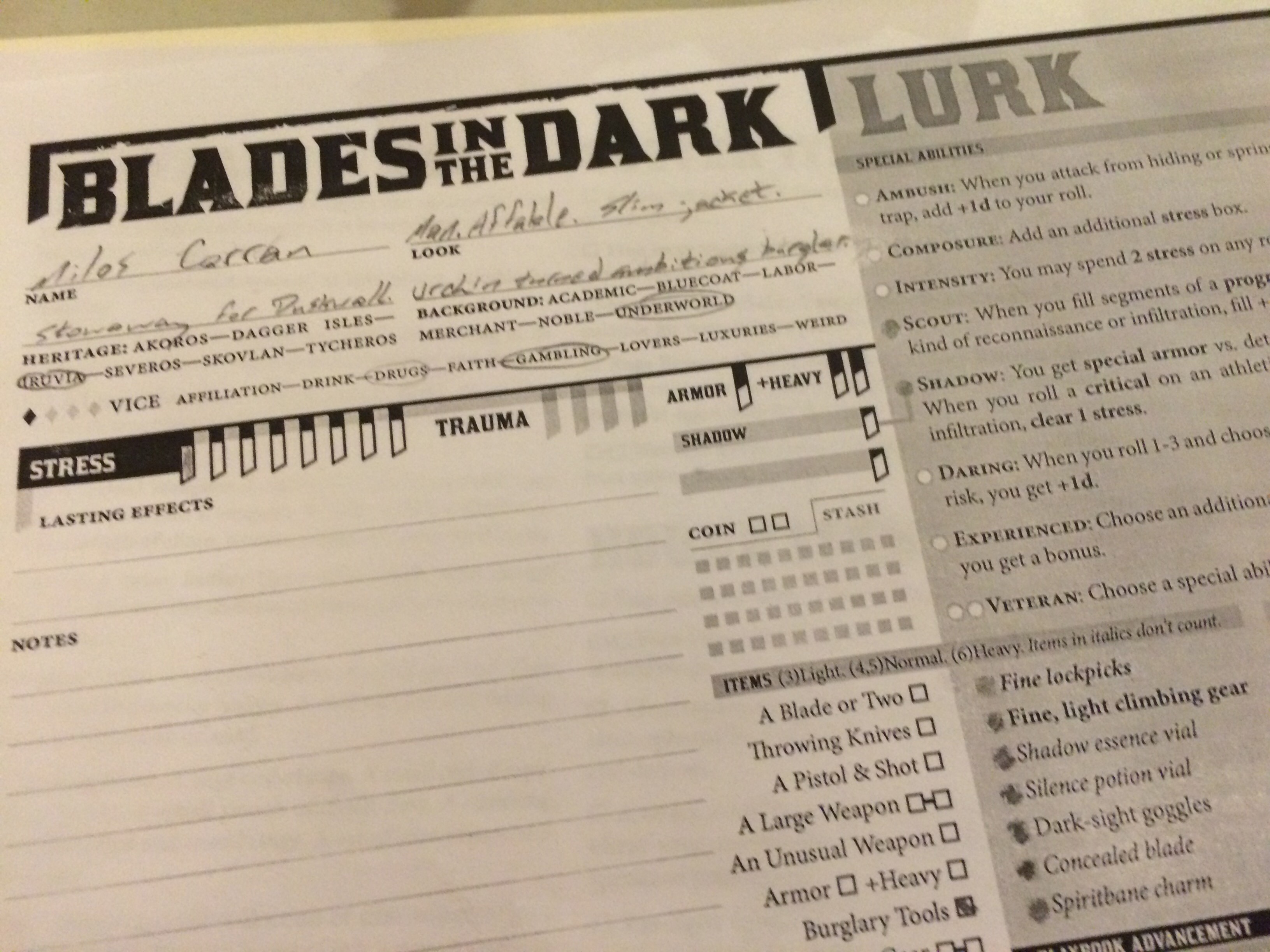Shifting My Mindset: The Tale of the Unreliable Narrators
Shifting My Mindset: The Tale of the Unreliable Narrators
In trying to 1) truly give power to players to call for rolls and actions and 2) use clocks to record narrative efforts rather than challenges presented to the players, as I think the game intends, I am finding I must restructure my mindset to more of the following (which is refreshingly different from most other games I’m used to):
In my gaming group, I am GM, but we are all telling the story of what happens when this crew tries to rise to the top. However, we are also all unreliable narrators.
As a result of our unreliability as narrators, the actual events of the scoundrels’ story are often quite different than how we initially tell it. With the dice, and through play, we find out how the story really goes. Are we really playing a metagame of the retired scoundrels sitting around reminiscing about the tales of their attempted rise to glory? Perhaps not, since that implies everyone lives.
So in practice, as GM, I set scenes. Players narrate the PCs doing things, impacting the world. Whenever the PCs face challenges or threats, I as GM can stop them and say “Wait a minute, tell it right, it wasn’t so clean and easy. You can’t forget the dogs.” I then describe whatever outcome of the threat seems natural, reasonable, and interesting: The PCs get face-gnawed by electroplasmically enhanced canines; or they set off alarms, get shot, drop the haul, kill their witness before he spills the beans, overpay on their debts or vice, fall head-over-heels in lustful folly, trash their fancy clothes, get tossed in Ironhook, etc. This is just like the rules’ example of the GM saying, basically, “The Unseen warned you not to meddle with their shipment. They firebomb your lair while you sleep. You wake up choking on thick smoke and trapped in by collapsing, blazing timbers. You roast your arms trying inneffectively to pry your way free, and soon after die ingloriously.”
Whenever players don’t want things to happen as indicated, they may “call for a roll” appropriate to their rationale for what really happened. They say, “No way, I would never let my gorgeous face be chewed by those wimpy mutts. Sure they pounced, but I laid them all out cold with my bare hands before any of them so much as yipped.” Another player says, “Well, you actually took about a whole 10 minutes to tussle them into submission, but lucky for you, I had formerly made a deal with the local spirit to dampen all the havoc you were raising. (Flashback)” “Oh yeah, right. Thanks for that.”
The Teamwork mechanics also seem to reinforce this mindset of authority bouncing among unreliable narrators. I say my piece then pass point (the narrator baton) to someone else. Other players, including the GM may (and likely will) change my story as needed, with backp actions, flashbacks, obstacles, or devil’s bargains.
John Harper has said a number of times that this game is a conversation, but what is key about saying that (to get my mind right about it at least) is recognizing that it’s a conversation among unreliable narrators mutually discovering what “really happened” through collective iterative narration and correction. That is why I as GM don’t need to call for rolls and don’t need NPC stats of any kind; I just need to state feasible and enjoyable outcomes and the other players can decide if they accept my take on the story or object. Players can also simply state outcomes similarly, but I may object or dice may indicate there is still more to discover of what really happened.
Conclusion
This perspective of playing as a troupe of unreliable narrators is likely not new or surprising to many of you, since it may in fact be the core of what makes something a “story game.” Nevertheless, while I have many gaming influences, this game seems to demand an exciting mindset that is not quite like any of those to which I’m accustomed. Therefore, I thought I’d share in case this musing on mindset might benefit others in a similar situation.

